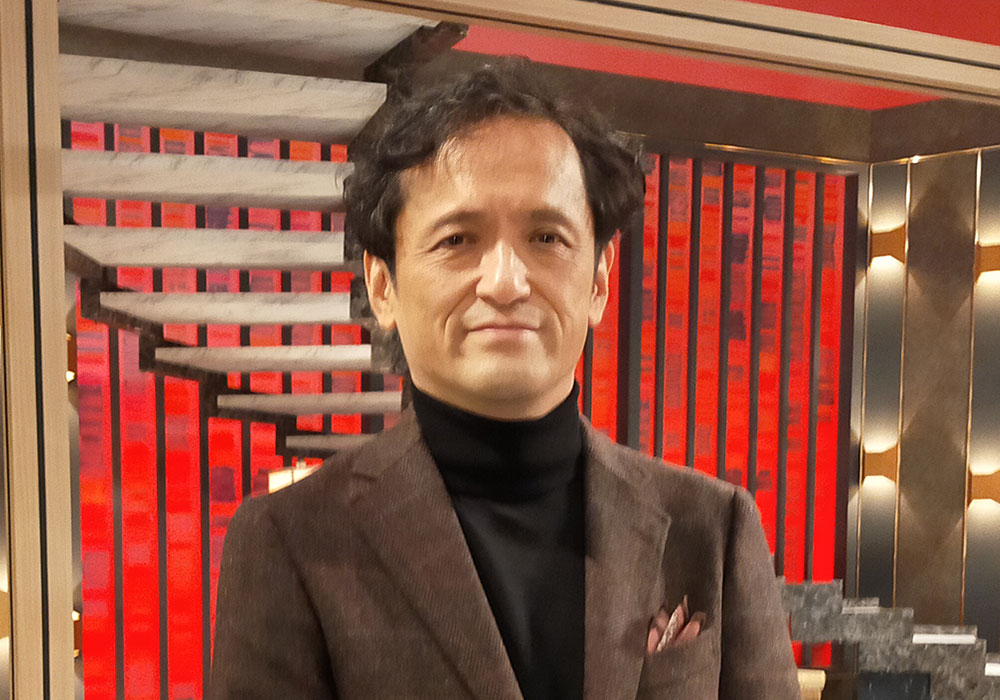Staff

Biography
Dr. Seki received his Ph.D. in the department of basic medical sciences of Tsukuba University in 1998. He spent four years in the Department of Physiology and Biophysics, and Washington National Primate center, Seattle,WA, USA as a HFSP long-term fellow (supervisor: Prof. Eberhard E.Fetz). From 2002 he worked at the department of developmental physiology, National Institute for Physiological Sciences, Okazaki, Japan as an assistant professor (Head: Prof. Tadashi ISA). Then, he has been moved to the Department of Neurophysiology of NCNP as a director of department in October 2009. He is also a JST (PREST) researcher (http://www.jst.go.jp/kisoken/presto/en/index.html) from 2008 to 2015.
Fields of specialization: Neurophysiology/ Systems Neuroscience
Research Interests
Motor command in the cortex execute and control voluntary movement by generating, timely, coordinated activity of multiple muscles through a number of cortical and subcortical circuit in the central nervous system (CNS). Then, executed voluntary movements stimulate sensory receptor and generate sensory signal that integrated into the motor command, not only produce the movement perception. My research interest is on the neural mechanism for selecting and regulating muscle(s) and its activity that is appropriate for control the intended movement in precise manner. Specifically, we are currently investigating how the multiple premotor systems in the CNS accomplishes this task in a cellular resolution. We are also interested in the mechanism how the sensory activity induced by voluntary movement are extracted/attenuated in the process to integrate them into motor command. Specifically, we are currently investigating the neural mechanism of information selection at the first sensory relay (e.g. Spinal cord or brainstem) and its behavioral relevance and relative contribution between reafference and descending command for generating muscle activity during voluntary movement. We have also started to explore the mechanism supporting plasticity of these sensorimotor systems. Long-term perturbation to this system is known to activate surrounding system to restore appropriate movement. We are establishing an experimental design and animal model that could be applicable to study neural plasticity after the purtubation. We are aiming to extent these research to the clinically relevant findings. By establishing the primate model human disease exhibiting movement disorder, we will be able to study the contribution of sensorimotor system as described for understanding these disease. For this purpose, we are developing a primate model of Stroke and neurodegenerative disease like Dominant Spinocerebellar Ataxias (SCA).
Research Achievements
- Jonas B Zimmermann., Seki K., Andrew Jackson.: Reanimating the arm and hand with intraspinal microstimulation. J. Neural Eng. 8(5). 054001, Aug, 2011.
- Seki, K. and Fetz, EE.: Gating of Sensory Input at Spinal and Cortical Levels during Preparation and Execution of Voluntary Movement. Journal of Neuroscience, 32(3): 890-902, Jan., 2012.
- Umeda T, Seki K, Sato M, Nishimura Y, Kawato M, and Isa T: Population coding of forelimb joint kinematics by peripheral afferents in monkeys. PLoS One 7(10): e47749, 2012.
- Takei T, Seki K: Spinal premotor interneurons mediate dynamic and static motor commands for precision grip in monkeys. Journal of Neuroscience 33:8850-60, 2013.
- Takei T, Seki K: Synaptic and functional linkages between spinal premotor interneurons and hand-muscle activity during precision grip. Frontiers in Computational Neuroscience 7:40, 2013.
- Ishibashi H, Motohashi HH, Kumon M, Yamamoto K, Okada H, Okada T, Seki K: Efficient embryo transfer in the common marmoset monkey (Callithrix jacchus) with a reduced transfer volume: a non-surgical approach with cryo-preserved late-stage embryos.Biology of Reproduction. 88(5):115. 2013 May 9.
- Ishibashi H, Motohashi HH, Kumon M, Yamamoto K,Okada H, Okada T, Seki K: Ultrasound-guided non-surgical embryo collection in the common marmoset. Reproductive Biology, 13(2):139-144, June 2013
- Ishibashi H, Motohashi HH, Kumon M, Yamamoto K, Okada H, Okada T, Seki K: Effect of the size of zona pellucida opening on hatching in the common marmoset monkey (Callithrix jacchus) embryo. Animal Science Journal. 84(11):740-743. 2013 Nov 3
- Puentes S, Kaido T, Hanakawa T, Ichinohe N, Otsuki T, Seki K.. Internal capsule stroke in the common marmoset: Neuroscience 284 400-411, 2015
- Yaguchi H, Takei T, Kowalski D, Suzuki T, Mabuchi K, Seki K: Modulation of spinal motor output by initial arm postures in anesthetized Monkeys. The Journal of Neuroscience 35(17): 6937-6945, 29 April 2015.
- Yamada H, Yaguchi H, Tomatsu S, Takei T, Oya T, Seki K: Representation of afferent signals from forearm muscle and cutaneous nerves in the primary somatosensory cortex of the macaque monkey. PLOS ONE, 11 (10): e0163948-, 2016
- Tomatsu S, Kim G, Confais J, Seki K: Muscle afferent excitability testing in spinal root-intact rats: Dissociating peripheral afferent and efferent volleys generated by intraspinal microstimulation. Journal of Neurophysiology 36(50), 2016
- Confais J, Kim G, Tomatsu S, Takei T, Seki K: Nerve-specific input modulation to spinal neurons during a motor task in the monkey. Journal of Neuroscience, 37(10): 2612-2626, Mar 2017
- Tomioka I, Ishibashi H, Minakawa EN, Motohashi HH, Takayama O, Saito Y, Popiel AH, Puentes S, Owari K, Nakatani T, Nogami N, Yamamoto K, Noguchi S. Yonekawa T, Tanaka Y, Fujita N, Suzuki H, Kikuchi H, Aizawa S, Nagano S, Yamada D, Nishino I, Ichinohe N, Wada K, Kohsaka S, Nagai Y, Seki K: Transgenic monkey model of the polyglutamine diseases recapitulating progressive neurological symptoms. eNeuro, 4 (2): 0250-16, 2017
- Kobayashi Y, Azuma T, Shimizu K, Koizumi M, Oya T, Suzuki R, Maruyama K, Seki K, Takagi S : Development of focus controlling method with tFUS aided by numerical simulation for non-invasive brain therapy, Jpn. J. Appl. Phys., accepted in Vol.57, No.7S1, June, 2018
- Tomioka I, Nagai Y, Seki K : Developing biomarkers for neurodegenerative diseases using genetically-modified common marmoset models. Neural Regen Res 13(7):1189-1190, July, 2018
- Kobayashi Y, Azuma T, Shimizu K, Koizumi M, Oya T, Suzuki R, Maruyama K, Seki K, Takagi S : Development of focus controlling method with tFUS aided by numerical simulation for non-invasive brain therapy, Jpn. J. Appl. Phys., accepted in Vol.57, No.7S1, June, 2018
- Azim E, Seki K : Gain control in the sensorimotor system. Current Opinion in Physiology, March 2019
- Kubota S, Sidikejiang W, Kudo M, Inoue KI, Umeda T, Takada M, Seki K:Optogenetic recruitment of spinal reflex pathways from large-diameter primary afferents in non-transgenic rats transduced with AAV9/Channelrhodopsin 2. J Physiol, 2019
- Umeda T, Koizumi M, Katakai Y, Saito R, Seki K: Decoding of muscle activity from the sensorimotor cortex in freely behaving monkeys. NeuroImage 197: 512-526, 15 August 2019
- Oya T, Takei T, Seki K: Distinct sensorimotor feedback loops for dynamic and static control of primate precision grip. Communications Biology 3(156), 2020
- Omata D, Hagiwara F, Munakata L, Shima T, Kageyama S, Suzuki Y, Azuma T, Takagi S, Seki K, Maruyama K, Suzuki R:Characterization of Brain-targeted Drug Delivery Enhanced by a Combination of Lipid-based Microbubbles and Non-focused Ultrasound. Journal of Pharmaceutical Sciences109(9):2827−2835
- Tomioka I, Nagai Y, Seki K : Generation of common marmoset model lines of spinocerebellar ataxia type 3. Front. Neurosci. doi: 10.3389/fnins.2020.548002
- Yaron A, Kowalski D, Yaguchi H Takei T, Seki K : Forelimb force direction and magnitude independently controlled by spinal modules in the macaque. PNAS 117(44): 27655 - 27666, 15 October 2020
- Cheung VCK, Seki K : Approaches to Revealing the Neural Basis of Muscle Synergies: A Review and A Critique. Journal of Neurophysiology, 17 March 2021
- Koizumi M, Nogami N, Owari K, Kawanobe A, Nakatani T and Seki K : Motility Profile of Captive-Bred Marmosets Revealed by a Long-Term In-Cage Monitoring System. Front. Syst. Neurosci. 15:645308, 15 April 2021
- Kudo M, Wupuer S, Fujiwara M, Saito Y, Kubota S, Inoue K, , Takada M, Seki K : Specific gene expression in unmyelinated dorsal root ganglion neurons in nonhuman primates by intra-nerve injection of adeno-associated virus 6 vector. Molecular Therapy : Methods and Clinical Development, 6 Aug 2021
Competitive Funding
- NICT 国際共同研究プログラムに基づく日米連携による脳情報通信研究 (第4回)令和3~6年(2021-2024)
- AMED(革新的技術による脳機能ネットワークの全容解明プロジェクト)平成26~30年(2014-2018), 令和1~5年(2019-2023)
- AMED(脳科学研究戦略推進プログラム)平成28~29年(2016-2017)
- AMED(創薬基盤推進研究事業)(TG) 平成26~28年(2014-2016)
- AMED(難治性疾患実用化研究事業)平成29~31年(2017-2019), 令和3~5年(2021~2023)
- 科学研究費補助金 新学術領域研究 平成23~24年(2011~2012), 平成26~30年(2014~2018),令和1~5年(2019-2023)
- 科学研究費補助金 基盤研究(A) 平成26~29年(2014~2017),令和1~4年(2019~2022)
- 学術研究助成基金助成金(挑戦的萌芽研究) 平成25~26年(2013~2014),令和1~2年(2019~2020)
- H30鈴木謙三記念医科学応用研究財団
- H30上原記念生命科学財団
- 精神・神経疾患研究開発費 平成29~31年(2017~2019),平成26~28年(2014~2016),平成29~31年(2017~2019), 令和2~4年(2020~2022)
- 精神・神経疾患研究開発費(26-短期) 平成26年(2014)
- 科学研究費補助金 基盤研究(B) 平成20年~22年(2008~2010), 平成23~25年(2011~2013)
- 精神・神経研究開発費 平成23~25年,平成24年
- 科学技術振興機構 さきがけ 平成20年~27年(2008~2015)
Self Introduction
大学院(筑波大学)を卒業後、シアトル(ワシントン大学)で3年間・岡崎(生理学研究所)で8年間過ごし、2009年より精神・神経医療研究センターでラボを立ち上げる事になりました。シアトルではEberhard Fetz教授のラボのポスドクとして多くの友人に恵まれ、彼らと一緒に研究だけでなくPacific Northwest特有の大自然を謳歌いたしました。岡崎では伊佐正教授のラボの助手(のち助教)として、脊髄慢性記録系の立ち上げに専念する一方、生理研での多くの研究会・セミナーなどを通じて多くの方々の影響を受けました。今後は研究活動内外を通じて、一人でも多くの方によい影響を与えられるようなラボを目指してゆきたいと思います。みなさんよろしくお願いいたします。



